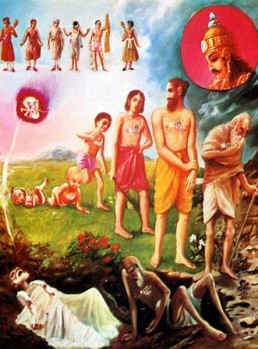Swami Chinmayananda Commentary
When one’s intellect comes to a steady equipoise, UNDISTURBED by any of the experiences that reach one through the five great arch-ways of knowledge, then one is considered as having attained Yoga.
The mind gets agitated mainly due to the flooding-in of the ever-new rush of stimuli from the outer world. Sense-organs are the antennae through which the world’s tickling signals creep in and disturb the mental-pool. One is considered as having attained Yoga only when one, even in the midst of enjoying sensuous pleasures, and even while the sense-organs are letting in a flood of stimuli, does not get at all disturbed in one’s inner serenity and equipoise This idea is better developed and exhaustively dealt with later in the chapter, where Krishna enumerates the visible qualities and the perceptible signs of one established in Wisdom (Sthita-Prajna).
The discussion so far, makes Arjuna so interested that he is now no more under the influence of his hysteria. He has come to forget his dejection and sorrow, and is now taking an active interest in Krishna’s exposition. He could not control himself from expressing his sincere enquiry as to what exactly is the nature of such a perfected one who is beyond the storms of sensuousness. The question evidently shows that though Arjuna’s intellect had somehow come to appreciate Krishna’s theory, something in him was not quite ready to accept it fully.
LINKING UP THIS STANZA WITH THE NEXT, SHANKARA SAYS: “ANXIOUS TO KNOW THE CHARACTERISTIC FEATURES OF ONE WHOSE INTELLECT HAS COME TO AN EQUIPOISE, HE ASKS THIS QUESTION, AS SOON AS HE GETS A CHANCE TO INTERROGATE”:
Adi Sankara Commentary
If it be asked, ‘By becoming possessed of the wisdom arising from the discrimination about the Self after overcoming the turbidity of delusion, when shall I attain the yoga of the supreme Reality which is the fruit that results from Karma-yoga?’, then listen to that; Yada, when at the time when; te, your; buddhih, mind; that has become sruti-vi-pratipanna, bewildered, tossed about, by hearing (the Vedas) that reveal the diverse ends, means, and (their) relationship, i.e. are filled with divergent ideas; sthasyati, will become; niscala, unshakable, free from the trubulence in the form of distractions; and acala, steadfast, that is to say, free from doubt even in that (unshakable) state; samadhau, in samadhi, that is to say, in the Self — samadhi being derived in the sense of that in which the mind is fixed; tada, then, at that time; avapsyasi, you will attain; yogam, Yoga, the enlightenment, Self-absorption, that arises from discrimination. Having got an occasion for inquiry, Arjuna, with a view to knowing the characteristics of one who has the realization of the Self, [By the word samadhi is meant the enlightenment arising from discrimination, which has been spoken of in the commentary on the previous verse. The steadfastness which the monks have in that enlightenment is called steadfastness in Knowledge. Or the phrase may mean, ‘the enlightenment achieved through meditation on the Self’, i.e. the realization of the supreme Goal.] asked:
The Bhagavad Gita with the commentary of Sri Sankaracharya – Translated by Alladi Mahadeva Sastry
Holy Geeta – Commentary by Swami Chinmayananda
The Bhagavad Gita by Eknath Easwaran – Best selling translation of the Bhagavad Gita
The Bhagavad Gita – Translation and Commentary by Swami Sivananda
Bhagavad Gita – Translation and Commentary by Bhaktivedanta Swami Prabupadha
Srimad Bhagavad Gita Chapter 2 – Verse 53 – 2.53 shruti-vipratipanna – All Bhagavad Gita (Geeta) Verses in Sanskrit, English, Transliteration, Word Meaning, Translation, Audio, Shankara Bhashya, Adi Sankaracharya Commentary and Links to Videos by Swami Chinmayananda and others – 2-53

